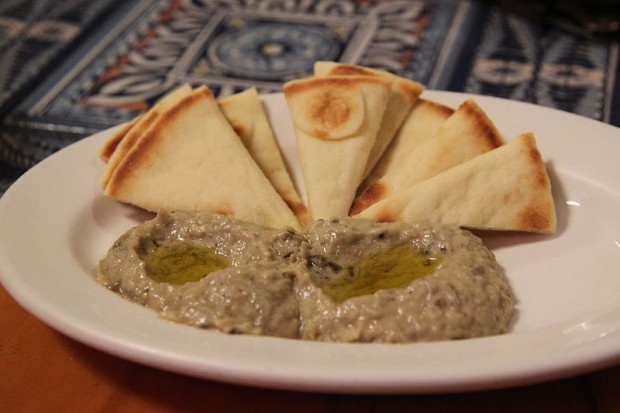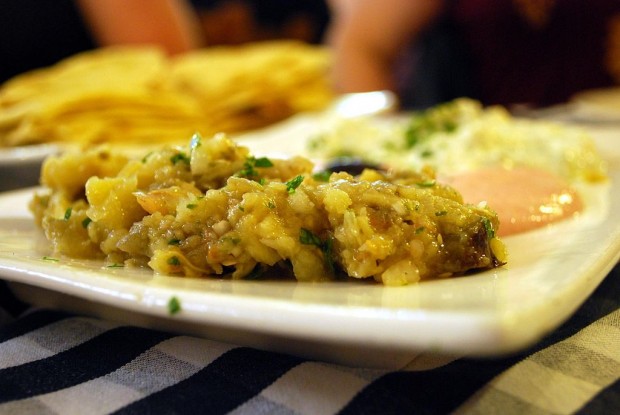Baba ghanoush or baba ghanoug is a Levantine dish of cooked eggplant mixed with onions, tomatoes, olive oil and various seasonings. The Arabic term means “pampered papa” or “coy daddy”, perhaps with reference to a member of a royal harem. The name has become integrated in the Middle-Eastern kitchen that people no longer question the reason behind the name.
According to Middle Eastern food lore, it alludes to an elderly, toothless father – or baba – whose daughter had to mash his food because he wasn’t able to chew it. This dish was famous in the Islamic golden times; the name came out of Syria and Lebanon later.
Baba ghanoush has been listed in Western countries’ restaurants as ‘eggplant caviar’
The Arabic preparation method is for the eggplant to be baked or broiled over an open flame before peeling, so that the pulp is soft and has a smoky taste. It is a typical appetizer, often eaten as a dip with khubz or pita bread, and is sometimes added to other dishes. It is popular in the Levant (area covering Jordan, Lebanon, Palestine and Syria) as well as in Armenia and Egypt.
A similar dish, but with mashed eggplants and without other vegetables, is known as mutabbal (literally ‘spiced’) in the Levant and in Armenia but is called baba ghanoush as well in Egypt.
In Jordan, Syria and Lebanon, baba ghanoush is made of eggplant blended with finely diced onions, tomatoes, and other vegetables. The Egyptian version, known in the Levant as mutabbal, is made of roasted, peeled, and mashed eggplant, blended with tahini, garlic, salt, and lemon juice. Cumin and chili powder can be added. It is normally served with a dressing of olive oil and pomegranate concentrate. In the traditional method, the eggplant is first roasted in an oven for approximately 30 to 90 minutes (depending on the size of the eggplant) until the skin appears almost burnt and the eggplant begins to collapse. The softened flesh is scooped out, squeezed or salted to remove excess water, and is then pureed with the tahini. There are many variants of the recipe, especially the seasoning. Seasonings include garlic, lemon juice, ground cumin, salt, mint, and parsley. When served on a plate or bowl, it is traditional to drizzle the top with olive oil.
Varieties of this dish are commonly known as patlıcan salatası (“eggplant salad”) in Turkey. It is typically made with mashed eggplants, while varieties with cut eggplants can be found in southern Turkey, especially in Antakya. In regions with large Arab population it can also be known as abu-gannoush, as the name “Baba” means father in Arabic and Turkish, and “abu” is another Arabic word for father






